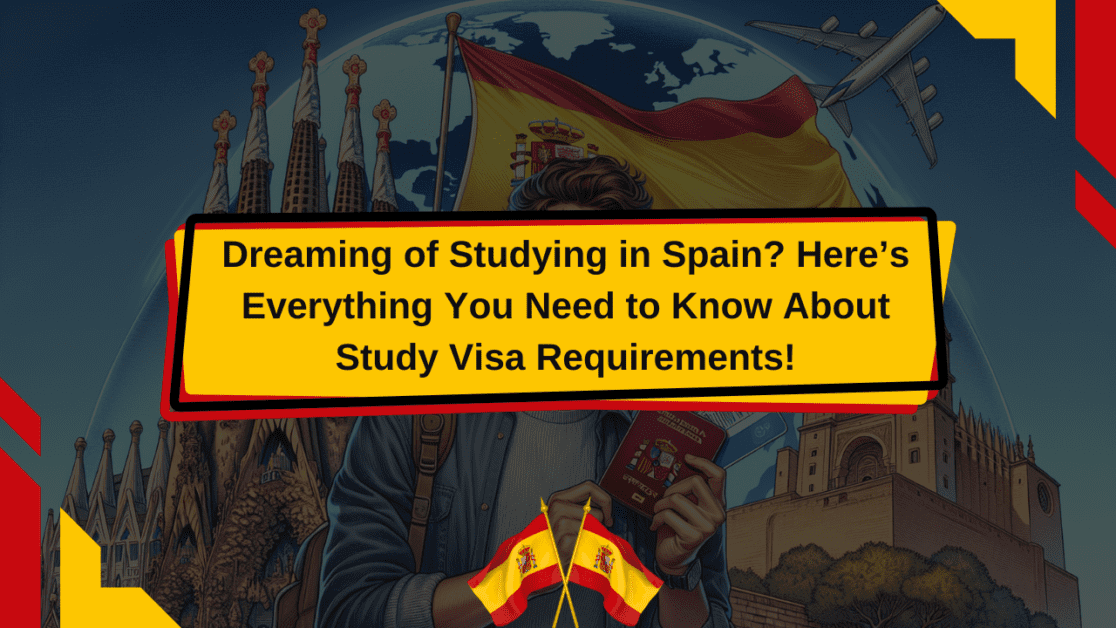
Spain, with its rich culture, prestigious universities, and vibrant lifestyle, beckons students from around the globe. But for many, the dream of studying in this Mediterranean paradise is clouded by the complexities of visa requirements. Are you one of the countless aspiring students feeling overwhelmed by the prospect of navigating Spain’s study visa process?
Don’t let confusion or anxiety hold you back from an incredible educational journey! 🌟 This comprehensive guide is your passport to understanding everything about Spain’s study visa requirements. From decoding the essential documents to breaking down the application process step-by-step, we’ll equip you with the knowledge to transform your Spanish study dreams into reality. Whether you’re concerned about language requirements, financial considerations, or what opportunities await you post-study, we’ve got you covered. Get ready to embark on an exciting adventure that begins with mastering the visa application and ends with you thriving in Spain’s academic landscape!
Understanding Spain's Student Visa
Types of student visas available
Spain offers several types of student visas to accommodate different educational pursuits:
- Short-term study visa (up to 90 days)
- Long-term study visa (more than 90 days)
- Language course visa
- Research or doctoral visa
| Visa Type | Duration | Ideal For |
|---|---|---|
| Short-term | Up to 90 days | Summer courses, short programs |
| Long-term | More than 90 days | Full degree programs, exchange semesters |
| Language course | Varies | Intensive language studies |
| Research/Doctoral | Up to 5 years | PhD candidates, researchers |
Benefits of studying in Spain
Studying in Spain offers numerous advantages:
- World-class education system
- Rich cultural experience
- Opportunity to learn Spanish
- Access to European job market
- Affordable living costs compared to other European countries
- Vibrant student life and community
Duration and validity of student visas
The duration of Spain student visas varies based on the type:
- Short-term visas: Valid for up to 90 days
- Long-term visas: Initially granted for one year, renewable annually
- Language course visas: Typically match the course duration
- Research visas: Can be valid for up to 5 years
Eligibility criteria for each visa type
Eligibility requirements differ slightly for each visa type, but generally include:
- Acceptance letter from a recognized Spanish educational institution
- Proof of sufficient funds to cover tuition and living expenses
- Valid passport
- Clean criminal record
- Health insurance coverage in Spain
For long-term and research visas, additional documents such as a medical certificate and proof of accommodation may be required. Language course visa applicants must show enrollment in an accredited language program. My Car Wisdom
Now that we’ve covered the basics of Spain’s student visa system, let’s explore the essential documents you’ll need for your application.
Essential Documents for Your Application
Preparing for your Spanish study visa application requires careful attention to detail and thorough documentation. Here’s a comprehensive list of essential documents you’ll need to gather:
A. Criminal Background Check
A clean criminal record is crucial for your Spain study visa application. Obtain an official police clearance certificate from your home country, covering at least the last five years of your residency.
B. Health Insurance Coverage
Adequate health insurance is mandatory for international students in Spain. Your policy should cover:
Medical expenses
Hospitalization
Repatriation
Coverage Type | Minimum Requirement |
|---|---|
Medical | Full coverage |
Hospitalization | 30,000 EUR |
Repatriation | Included |
C. Financial Solvency Documents
Prove your ability to support yourself during your studies. This typically includes:
Bank statements (last 6 months)
Scholarship award letters
Sponsorship documents
D. Proof of Acceptance from a Spanish Educational Institution
Submit an official acceptance letter from your chosen Spanish university or educational institution. This document should specify:
Course details
Duration of study
Tuition fees
E. Passport and Photographs
Ensure your passport is valid for the entire duration of your intended stay in Spain. Additionally, provide:
Recent passport-sized photographs
Photocopies of your passport’s bio-data page
Remember to check with the Spanish embassy or consulate in your country for any additional document requirements specific to your situation. Gathering these essential documents well in advance will streamline your Spain study visa application process and increase your chances of approval.
Step-by-Step Application Process
Gathering Required Documents
Before initiating your Spain study visa application, it’s crucial to compile all necessary documents. Here’s a checklist of essential items:
Valid passport
Completed visa application form
Recent passport-sized photographs
Proof of acceptance from a Spanish educational institution
Proof of accommodation in Spain
Health insurance coverage
Proof of financial means
Scheduling an Appointment at the Spanish Embassy or Consulate
Once you’ve gathered all required documents, the next step is to schedule an appointment at your nearest Spanish embassy or consulate. This can typically be done online through the official website or by phone. Be sure to choose a date well in advance of your intended travel, as processing times can vary.
Attending the Visa Interview
The visa interview is a critical part of the application process. During this meeting, you’ll need to:
Present all required documents
Answer questions about your study plans
Demonstrate your language proficiency
Explain your reasons for choosing Spain
Interview Tips | Description |
|---|---|
Be punctual | Arrive at least 15 minutes early |
Dress appropriately | Choose formal or business casual attire |
Be prepared | Review your application and documents beforehand |
Stay calm | Maintain composure and answer questions confidently |
Submitting Your Application and Paying Fees
After the interview, you’ll submit your application along with all supporting documents. The visa fee must be paid at this time. Be aware that fees can vary depending on your country of origin and the type of visa you’re applying for.
Now that you’ve completed the application process, the next step is to prepare for your stay in Spain. This includes arranging accommodation, familiarizing yourself with the local culture, and improving your Spanish language skills if necessary.
Preparing for Your Stay in Spain
Once you’ve secured your Spanish student visa, it’s time to prepare for your exciting journey. Here are essential steps to ensure a smooth transition to life in Spain:
A. Opening a Spanish Bank Account
Opening a local bank account is crucial for managing your finances in Spain. Here’s what you need to know:
Required documents: Passport, NIE (Foreigner Identification Number), proof of address, and student visa
Popular banks: Santander, BBVA, CaixaBank
Student-friendly accounts often offer lower fees and special benefits
B. Understanding Healthcare Options
Spain offers excellent healthcare, but it’s important to understand your options:
Healthcare Type | Description | Pros | Cons |
|---|---|---|---|
Public Healthcare | Available with NIE registration | Comprehensive coverage, low-cost | Potential language barriers |
Private Insurance | Required for some visas | Shorter wait times, English-speaking staff | Higher costs |
C. Registering with Local Authorities
Upon arrival, you must register with local authorities:
Obtain an NIE (Foreigner Identification Number)
Register at the local town hall (empadronamiento)
Apply for a TIE (Foreigner Identity Card) if staying over 6 months
D. Finding Suitable Accommodation
Securing housing is a critical step. Consider these options:
University dormitories: Convenient, but limited availability
Shared apartments: Cost-effective, social atmosphere
Private rentals: More independence, potentially higher costs
Tips for finding accommodation:
Start your search early
Use reputable websites or university housing services
Be prepared to provide a deposit and references
With these preparations in place, you’ll be well-equipped to begin your Spanish study adventure. Next, we’ll explore the language requirements and preparation needed to thrive in your Spanish academic environment.
Language Requirements and Preparation

Mastering the language of instruction is crucial for a successful academic experience in Spain. Whether you’re planning to study in Spanish or English, adequate preparation is key.
A. Language preparation resources and courses
To enhance your language skills before studying in Spain, consider these resources:
Online platforms:
Duolingo
Babbel
Rosetta Stone
In-person courses:
Instituto Cervantes
Local language schools
Language exchange programs:
Tandem partners
Conversation groups
Resource Type | Pros | Cons |
|---|---|---|
Online platforms | Flexible, self-paced | Limited interaction |
In-person courses | Immersive, structured | Time-consuming, costly |
Language exchange | Free, cultural exposure | Inconsistent quality |
B. English-taught programs and their requirements
Many Spanish universities offer English-taught programs, especially at the graduate level. Requirements typically include:
IELTS (minimum score: 6.5)
TOEFL iBT (minimum score: 90)
Cambridge English: Advanced (CAE) or Proficiency (CPE)
C. Spanish language proficiency tests
For Spanish-taught programs, proficiency is often assessed through:
DELE (Diplomas de Español como Lengua Extranjera)
SIELE (Servicio Internacional de Evaluación de la Lengua Española)
These tests evaluate reading, writing, listening, and speaking skills. Most universities require a B2 level for undergraduate studies and C1 for graduate programs.
With language requirements addressed, it’s important to consider the financial aspects of studying in Spain. Next, we’ll explore the various financial considerations you should keep in mind when planning your academic journey.
Financial Considerations
When planning to study in Spain, it’s crucial to understand the financial aspects of your stay. This section will cover important financial considerations for international students.
A. Part-time work regulations for students
International students in Spain are allowed to work part-time while studying, subject to certain restrictions:
Maximum 20 hours per week during the academic year
Full-time work permitted during holidays
Work permit not required if the job contract duration is less than 3 months
B. Scholarship opportunities for international students
Spain offers various scholarship programs for international students:
Scholarship | Eligibility | Benefits |
|---|---|---|
Erasmus+ | EU/EEA students | Tuition fee waiver, monthly stipend |
MAEC-AECID | Non-EU students | Full tuition, monthly allowance, health insurance |
Fundación Carolina | Latin American students | Full or partial funding for postgraduate studies |
C. Cost of living in various Spanish cities
The cost of living varies significantly across Spanish cities:
Madrid and Barcelona: €900-€1,200 per month
Valencia and Seville: €700-€900 per month
Smaller cities: €600-€800 per month
These estimates include accommodation, food, transportation, and personal expenses.
D. Tuition fees for different programs
Tuition fees in Spain depend on the type of institution and program:
Public universities:
Bachelor’s programs: €750-€2,500 per year
Master’s programs: €1,500-€3,500 per year
Private universities:
Bachelor’s programs: €5,000-€18,000 per year
Master’s programs: €10,000-€25,000 per year
Understanding these financial aspects will help you better prepare for your study experience in Spain.
Post-Study Opportunities in Spain
Spain offers numerous opportunities for international students after completing their studies. This section explores various pathways to extend your stay and build a career in this vibrant country.
Networking and Career Resources for International Students
Spain provides a wealth of resources to help international graduates kickstart their careers:
University career centers
Online job portals (e.g., InfoJobs, LinkedIn)
Industry-specific networking events
Alumni associations
Resource Type | Examples | Benefits |
|---|---|---|
Online Platforms | InfoJobs, LinkedIn | Wide range of job listings, easy application process |
University Services | Career centers, Job fairs | Tailored advice, direct employer connections |
Professional Networks | Chamber of Commerce events | Industry insights, networking opportunities |
Pathways to Permanent Residency
For those wishing to stay long-term, Spain offers several routes to permanent residency:
Long-term residence permit (after 5 years of continuous legal residence)
EU long-term residence permit
Golden Visa program (for significant investments)
Marriage to a Spanish citizen
Job Search Visa Options
Spain provides specific visas for recent graduates seeking employment:
Job search visa for highly qualified professionals
Job search visa for entrepreneurs
These visas typically allow a stay of up to one year to look for work or start a business.
Extending Your Stay After Graduation
Recent graduates can extend their stay in Spain through various means:
Applying for a work permit if you’ve secured a job offer
Enrolling in further studies and extending your student visa
Participating in internship programs
Applying for a non-lucrative residence permit
With these opportunities, Spain continues to be an attractive destination for international students looking to build their careers in Europe.
Conclusion
Embarking on a study journey in Spain opens doors to a world of cultural richness, academic excellence, and personal growth. From understanding visa requirements to preparing for language proficiency and financial considerations, prospective students now have a comprehensive guide to navigate the application process. The step-by-step approach outlined in this post simplifies the complex procedure, ensuring that aspiring scholars can focus on their academic goals without being overwhelmed by bureaucratic hurdles.
As you prepare for this exciting chapter in your life, remember that thorough preparation is key to a smooth transition. Take advantage of language preparation opportunities, explore financial aid options, and consider the post-study prospects that Spain offers. With its vibrant culture, world-class education system, and welcoming atmosphere, Spain awaits to provide an unforgettable academic experience that will shape your future in remarkable ways.
Ready to explore? Start your visa application today and get one step closer to your adventure!
Don’t let uncertainties hold you back. Our team of expert overseas education consultants is readily available to assist you. Whether you have inquiries about:
Specific document requirements
Interview preparation tips
Visa application timelines
We’re ready to provide personalized guidance tailored to your unique situation. Get in Touch Today at: +919041818122 and begin your journey with Vrinda International.
The information provided in this blog is for general guidance purposes only. Visa policies, application procedures, and fees are subject to change without prior notice. For the most accurate and up-to-date details, we recommend contacting us directly or consulting official sources. Feel free to reach out to us for personalized assistance with your visa application or travel needs.
FAQ - Frequently Asked Question
1. What are the basic Spain study visa requirements for international students?
To apply for a Spain study visa, you need an acceptance letter from a recognized Spanish educational institution, proof of financial stability, a valid passport, a medical certificate, and proof of accommodation in Spain.
2. How can I apply for a Spain student visa?
You can apply for a Spain student visa by submitting an application to your local Spanish consulate or embassy. The process includes filling out the visa application form, providing necessary documents like your passport, academic records, and proof of funds, and attending an interview.
3. What is the processing time for a Spain study visa?
The processing time for a Spain study visa usually ranges from 1 to 3 months, depending on your country of residence and the specific requirements of the Spanish consulate. It’s advisable to apply at least 2-3 months before your course start date.
4. What documents are required for a Spain student visa application?
The essential documents for a Spain student visa application include a completed application form, valid passport, acceptance letter from a Spanish institution, proof of health insurance, financial statements, a medical certificate, and a recent passport-size photograph.
5. Do I need a visa to study in Spain if I am from the EU?
No, students from EU/EEA countries do not need a visa to study in Spain. However, they must register with local authorities and provide proof of financial stability and health insurance.
6. What is the cost of a Spain student visa?
The cost of a Spain student visa varies depending on your nationality. Typically, it ranges from €60 to €150. It’s best to check with your local Spanish consulate for the exact fees.
7. Can I work while holding a Spain study visa?
Yes, international students with a Spain study visa can work part-time, up to 20 hours per week, as long as it does not interfere with their studies. You may need to apply for a work permit to do so.
8. How long is a Spain student visa valid?
A Spain student visa is usually valid for the duration of your study program, up to one year. If your course is longer than a year, you can renew the visa annually by showing continued enrollment and academic progress.
9. Can I extend my Spain study visa after completing my studies?
Yes, you can extend your Spain study visa if you plan to pursue further studies or participate in internships. You need to show proof of enrollment in a new course or an internship agreement.
10. What should I do if my Spain student visa is denied?
If your Spain student visa application is denied, you can appeal the decision or reapply with improved documentation. Make sure to address any issues mentioned in the rejection notice before submitting a new application.



